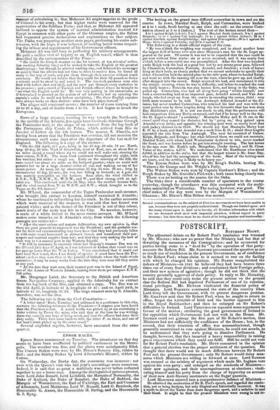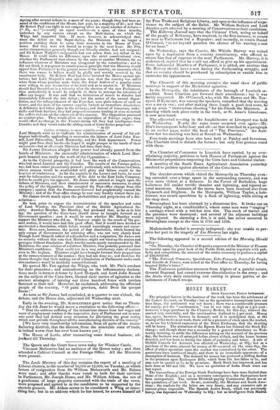POSTSCRIPT.
SATURDAY NIGHT.
The adjourned debate on Sir Robert Peel's resolution was resumed by Mr. hirtztEs ; who saw no power that the Ministry had but that of thwarting the measures of the Consegatives ; and he accounted for parties having come to a "dead fix" by the operation of that party- measure the Reform Bill. Mr. SkNFORD pronounced the question as not so much one of confidence in the present Government, as of confidence in Sir Robert Peel ; whose claim to it seemed to rest on the facility with which he changed his opinions. Mr. Denny recapitulated the defeats of Ministers—in 1841 he believed they had been beaten three times out of every four divisions ; and condemned their Foreign policy, and their new system of agitation ; though he did not think that the country generally approved of their policy. In reply to Mr. Macaulay, he said that they could only resist the present motion on the ground that the Reform Bill had deprived Parliament of one of its constitu- tional privileges. Mr. HUTTON vindicated the financial policy of Ministers. Lord NORREYS contrasted the state of the country when Lord Grey left the Government, with its present dangerous position. Mr. Gaarrast said that Sir Robert Peel, when he sought to return to office, forgot the 8,000,000 of Irish and the barrier opposed to him in the Royal Bedchamber; and then be enlarged on Sir Robert's difficulties in Ireland. Lord TEIGNMOUTH repeated some arguments in favour of the motion ; attributing the good government of Ireland to The opposition which Government had met with in the House. Mr. Nauss' could not gainsay the first part of Sir Robert's motion, that Ministers had not sufficiently the confidence of the House ; but, to the second, that their retention of office was unconstitutional, though generally constrained to vote against Ministers, he could not accede, as he underst000d that they were going to dissolve Parliament. He thought, however, that they incurred a heavy responsibility in raising great expectations which they could not fulfil. Still he could not vote for Sir Robert Peel's resolution. Mr. How concurred in the opinion that a general election was the proper settlement of the question. He thought that there would not be much difference between Sir Robert Peel and the present Government ; only Sir Robert would delay mea- sures which Ministers are willing to forward at once. Lord SANDON was amused at the subtlety of argument which made Mr. Ingham vote against his own party ; and enlarged on the misdeeds of Ministers— their new agitation, and their unscrupulousness at elections ; vindi- cating himself and his party from the charge of hypocrisy on account of their new Anti-Slavery sentiments on the Sugar question. Lord MORPETH entered into a comprehensive defence of Ministers— He admitted the moderation of Sir R. Peel's speech, and regarded the resolu- tion, not as being factious, but only illogical and historically incorrect. It was a :squib to divert the Tories from more dangerous sport, and a sedative to cool their blood. It might be that the present Ministers were wrong hi not re- signing after several defeats in a space of six years ; though they had been as- sured of the confidence of the House, last year, by a majority of 21; and that Sir Robert Peel was right in not resigning after an equal number of defeats- (" No, no / ")—nearly an equal number—in a space of three months, unbroken by any success except on the Malt-duties, on which the Whigs had supported him. It must, however, be acknowledged that, since the defeat on the Sugar-duties, the Ministers bad no longer a position enabling them to carry their measures in the House of Com- mons. But they were not bound to resign in the next hour. Mr. Pitt, under circumstances generally though not literally similar, had not resigned; and Sir Robert Walpole's resignation had not arisen from any defeat in the House. It could make no difference, upon the strict constitutional view, whether the Parliament were chosen by the same or another Minister, for no influence whatever of Ministers was recognized by the constitution : and Ile did not think it repugnant to constitutional principle that the Ministry should appeal from Parliament to the general sense of the country, on measures which there was reason to believe would be gladly and warmly received by the constituent body. Sir Robert Peel had twice lectured the House against agitation; but Lord Morpeth's own opinion was, that the country was safest when those whose position made them the fittest leaders of a popular cause were willing to put themselves at its head and so to master it. If Ministers should find themselves in a minority after the election of the new Parliament, then undoubtedly it would be culpable in them to attempt the retention of office any longer. It was said that no intimation of intent to dissolve had immediately followed the late defeat ; but the notice of the annual Sugar- duties, and the relinquishment of the Poor-law, were plain tokens of such an intent, and the state of the current supplies forbade an immediate dissolution. A deficiency had taken place in the revenue; and instead of temporary make- shifts and fresh burdens, they had proposed measures tending at once to recruit the coffers and extend the commerce of the country. The Opposition produced no counter-plan. They would allow no importation of Foreign sugar; they would effect no change in the Timber-duties till they had intelligence from Canada; and they would make the sliding-scale of Corn-duties perpetual— "At et labeler, in mime volubilis re u tile
m.
Lord Morpeth went on to vindicate the administration of several of his col- leagues individually, applauding in succession the labours of Lord John Rus- sell, Lord Palmerston, Lord Normanby, and the Irish department. Power might pass from their hands—he hoped it might prosper in the hands of their successors—but at all events Ministers had done their duty.
Sir JAMES GRAHAM alleged that power had already passed from the hands of Ministers : the successful administration of which Lord Mor- peth boasted was really the work of the Opposition— As to the Colonial prosperity, it had been the work of the Conservatives, who had saved Jamaica and the Canadas. The results of the Foreign policy, too, had been rather prematurely praised ; particularly with reference to China, where success would be unattended with glory and failure would be the heaviest of misfortunes. As for the exploits no the Levant and India, he must wait for information and the account of the debt to the East India Company, before he could give his approval. Sir James then entered at length upon the defeats of Ministers, and their abandonment of successive measures, to adopt the policy of the Opposition. He excepted the Post-office change from this category; against that the Postmaster-General had prophetically warned the Ministry; and of the Post-office change he now very frankly wished them joy.
Sir James dwelt much upon the probabilities and proprieties of a dis- solution— He took pains to expose the inconsistencies of the speeches and votes of Lord Wortley, the President elect of the British Agricultural So- ciety. Another Member, Mr. Handley, had professed that, as far as in him lay, the question of the Corn-laws should never be brought forward as a Government question : now it would be seen whether Mr. Handley would support the Ministers who did so. Whatever might be the result of the pre- sent motion, it would have had this good effect, that it would have decided or accelerated a dissolution, which before seemed exceedingly remote and uncer- tain. Even now, however, the period of that dissolution, which formed the only excuse of Government for retaining office, was not very dearly fixed. Though Lord Morpeth talked of a dissolution and a resignation, Sir James saw no security without this vote that Ministers might not wind up the session and prorogue without dissolution. Such was the course openly recommended by Mr. Bolshouse, the near relation of a Cabinet Minister, who probably possessed that Minister's confidence. That could not be a very satisfactory state of matters even to Mr. Ingham. Ministers might have brought forward their propositions at the commencement of the session : they had not done so; and therefore Sir James thought that their making use of a dissolution of Parliament under such -circumstances would be decidedly unconstitutional. He quoted Mr. Fox against the Whigs, who took Mr. Pitt's conduct for their precedent ; and animadverting on the inflammatory declara- tions made in former debates by Lord Morpeth and Lord John Russell on the subject of the Corn-laws, likened their tactics of agitation to the ancient stratagem of turning out three hundred foxes with torches fastened to their tail. However, he exclaimed, addressing the offended people of the country, "0 passi graviora, dabit Deus his quoque finem I"
As soon as Sir James had concluded, at a quarter to one o'clock, the debate, and the House also, adjourned till Wednesday next.
Early in the evening, Mr. SCHOLEFIELD gave notice that on Thurs- day the 8th June he would move a resolution to the following effect— "That the extreme suffering of the industrious classes from low wages and want of employment renders it the imperative duty of Parliament not to sepa- rate until they had devised some measures fur alleviating the great misery which now prevails throughout all the manufacturing districts of the country."
[We have very trustworthy information, from all parts of the manu- facturing districts, that the distress, from the miserable state of trade, is indeed worse than has ever been known yet.] The House of Lords, after transacting some formal business, ad- jonked till Thursday.



























 Previous page
Previous page